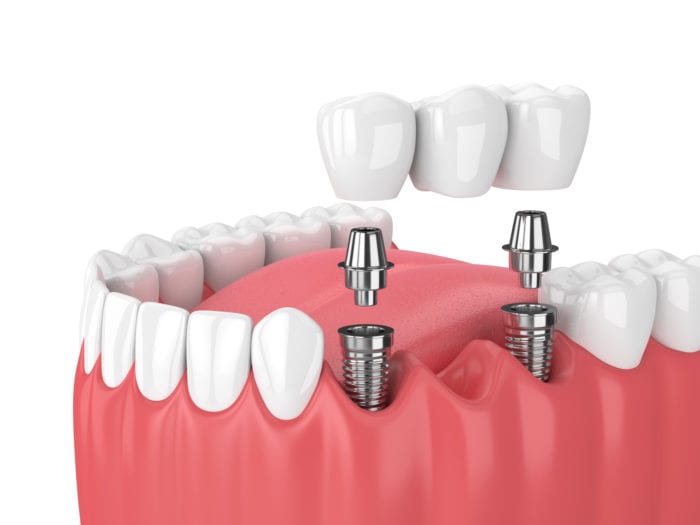Are you missing one or more teeth and searching for a solution to restore what you’ve lost? At Advanced Dental Health, we build expertly designed dental bridges that blend seamlessly with the natural smile and enable you to speak, bite, and smile confidently.
Dental bridges replace one missing tooth or several consecutive missing teeth. A bridge is either fixed or removable; this is decided based on the needs of the patient. Most patients opt for an implant-secured dental bridge because it offers one of the most natural-looking, stable solutions for missing teeth. However, traditional dental bridges are an excellent alternative for patients who are not able to receive dental implants.
We offer a full range of beautiful, long-lasting solutions for patients who are missing teeth. Our cutting-edge technology and high-level training allow us to craft beautiful restorations that we design with your needs in mind.
Through expert diagnosis, technology-based design, and treatment planning, our team can provide the highest level of dental care to help restore lost teeth. Visit our dental office to discover if a traditional or implant-secured dental bridge is right for you.
Implant-Supported Dental Bridge
Traditionally, a dental bridge is an artificial tooth secured by dental crowns placed on opposite sides of the tooth. A traditional dental bridge only restores the visible parts of the tooth. An implant-supported dental bridge uses dental implants, which fuse with the jaw bone. Dental implants replace both the root of the tooth and the visible portion of the tooth, making it a natural-looking, stable solution for missing teeth.

In most cases, patients will need to have an adequate amount of healthy bone structure to undergo the dental implant procedure. Drs. Izadi and Rafat will evaluate the condition of the teeth, jaw, and bone structure to determine if you are an ideal candidate for dental implants.
Benefits of A Dental Bridge
There are numerous types of dental bridges, each offering its respective benefits. The main goal of a dental bridge is to restore missing teeth and give patients a stable, beautiful smile. In addition to this, a dental bridge can also:
- Restore Speech. When the teeth are lost, patients may have a difficult time speaking. With a dental bridge, patients can speak confidently again.
- Improve oral health. When the teeth are lost, the remaining teeth shift in an attempt to fill the space. Replacing missing teeth with a dental bridge can prevent shifting teeth.
- Enhance your facial features. Missing teeth can often lead to sunken cheeks and facial sagging, which causes patients to appear older than they are. Replacing missing teeth can give the face the volume it needs to appear youthful.
Dental Bridge FAQs
How long does a dental bridge normally last?
A traditional dental bridge, on average, lasts around 5-15 years, or even longer if you take good care of it. An implant-supported bridge can be a lifelong solution for your missing teeth.
How can I clean under a dental bridge?
For optimum care, we recommend using a water pick. You can use super floss and other solutions, but a water pick is an easy and effective way to ensure you clean it properly.
Does a dental bridge feel natural?
An implant-supported bridge should feel natural. It may even feel better than your normal teeth if they were weak or had cavities and other oral health issues. It takes longer to adjust to a traditional dental bridge. However, it still feels natural with a bit more time.
Schedule An Appointment
Would you like to learn more about how dental bridges can enhance your natural smile and restore missing teeth? Visit our team at Advanced Dental Health for a restorative consultation. We combine cutting-edge technology and advanced training to deliver personalized solutions for patients who have lost teeth. To explore your treatment options, call (410) 656-2278 or request an appointment online.
